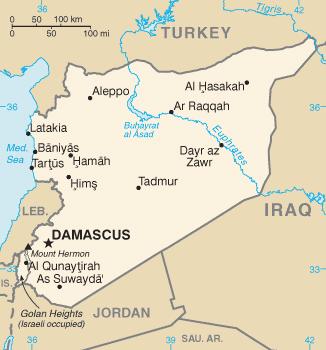White House calls for ‘punishment’ of Assad

Alleged chemical weapon attack happened in Damascus, Syria. There are talks stating that there is a potential the United States will go to war.
August 28, 2013
The possibility of war is on the lips of the international community as tension between Syria and the United States and its allies has continued to increase.
Syrian rebels claim nearly 1,300 Syrian citizens have died in a chemical weapon attack exercised by the Syrian government last week. The United Nations has been investigating the claims.
President Barack Obama and his administration currently are preparing for military action, which the White House is calling a “punishment” for the Bashar al-Assad ran government. Obama has stated that the action taken would not include soldiers on Syrian soil.
The administration is calling the punishment a very limited attack, which Richard Mansbach, professor of political science at Iowa State, said would mainly consist of long range airstrikes and missile strikes against airfields and chemical factories in Syria.
Obama said a year ago that a “red line” was drawn with Syria over the possible use of chemical weapons. Many are saying that the line has been crossed when Syria allegedly issued a chemical attack against its own citizens.
James McCormick, professor and chair of political science at Iowa State, said he believes Obama’s credibility is at stake if he were to not take action.
“This is a moral issue at stake,” McCormick said. “This brings to question how credible the U.S. is. It could even affect our credibility against Iran’s nuclear program. … [But] even if you take action, the U.S. doesn’t have a coherent plan for bringing about change in Syria. The ultimate policy is not clear to me of what the administration’s plan is for the Assad government.”
Mansbach sees a war in Syria as a no-win situation and as being very unpopular with the American public.
“There is no way you could win by getting involved in this,” Mansbach said. “It is a hard task to try to shape domestic and internal politics of another government, especially in a declining government like Syria.”
Mansbach also said the United States would have trouble deciding who to side with in the Syria conflict. Assad’s government is allies with Iran and Hezbollah, and the rebels consist of support from moderate Sunnis and al-Qaida.
Talks within the U.N. Security Council between the U.S., the United Kingdom, France, China and Russia, pertaining to a draft resolution authorizing “all necessary measures” to protect Syrian citizens has continued with China and Russia showing opposition of immediate action against Syria.
Russian officials are calling it “premature” to make a decision until the U.N. weapon inspectors have delivered a report about the chemical weapons attacks alleged by the Syrian rebels.
The United States, United Kingdom and France are considering taking action without U.N. authorization.
“If action is to be taken, Obama needs to go to Congress. He should get them to approve the kind of actions that will be taken,” McCormick said. “He would get the approval and would be much more in line with the constitutional system then.”
In a news release sent out Wednesday, Aug. 28, U.S. Rep. Bruce Braley, D-Iowa, condemned the apparent use of chemical weapons by the Syrian government against its own people.
“An American response to this grotesque act is appropriate,” Braley said in the release. “However, Congress should be a part of deciding the proper use of American force and ensuring that, before we take action, there is a plan for the aftermath of any military intervention. … Congressional involvement not only will add credibility to our actions in the international community, it will send a stronger message to the Syrian regime that America stands united against its despicable acts.”






